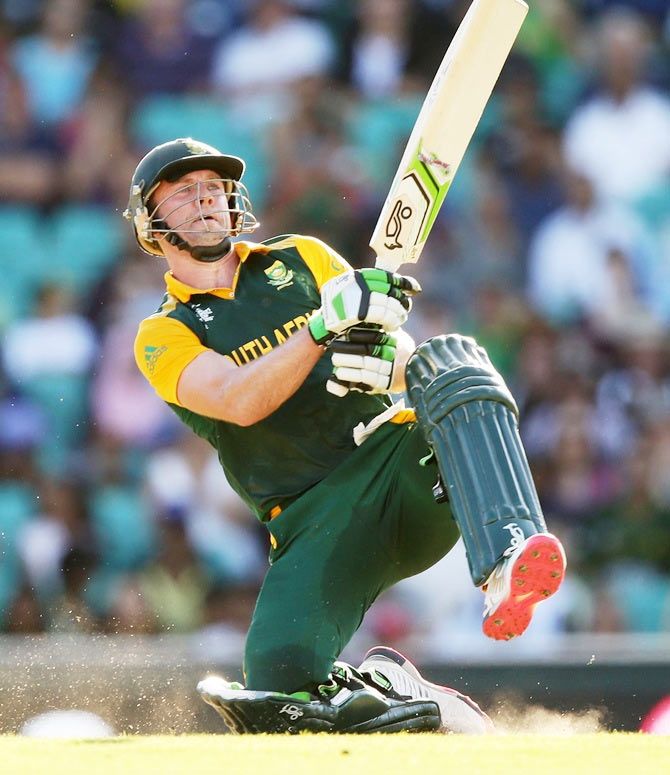A selection of musings from around the cricket World Cup

All praise to De Villiers, Gayle and Warner but the 50-over game needs some variation to keep interest.
Twice in the last week South Africa have posted 400, against West Indies and Ireland. Australia raised the bar for the highest total recorded in any World Cup to 417 for six when they thrashed Afghanistan - and their winning margin of 275 runs was another World Cup record.
- The World Cup, as never before on Rediff.com
- VOTE: Who will win the 2015 World Cup?
Where will all this hitting end -- with every ball going to the boundary and teams scoring 1,000 off their 50 overs? Not England, of course. They are delirious if they reach 300.
David Warner contributed 178 off 133 balls to the emphatic victory over Afghanistan that Australia needed after their one-wicket defeat by New Zealand. Warner was dismissed in the 38th over: had he batted through the innings from first ball to last, as Chris Gayle did against Zimbabwe, he would have rocketed past Gayle's 215 to set another record for the highest individual innings in a World Cup.
Afghanistan's pace attack is perfectly presentable too -- several Test-playing countries can hardly do better. Yet they were still blitzed and blasted all round Perth by Warner, Steve Smith and Glenn Maxwell, who made his 88 off 39 balls, a rate worthy of AB de Villiers himself.
It is not in the first 10 overs that run rates are spiralling: the figures for the initial power play in this World Cup are scarcely higher than for the last one in 2011. It is not in the middle overs either that batsmen are running amok, but in the last 15, usually sparked by the batting power play from overs 36 to 40.
Most commentators seem agreed that a maximum of four fielders outside the semicircles is too few: another administrative folly. Whether bowlers have a long-on, long-off and one deep fielder on either side, or four men out on the leg side and nobody on the offside, or some other combination, the game is weighted in favour of batsmen excessively.
English cricket plays the blame game better than it does the 50-over game

In the last few years it has been a constantly evolving task deciding which character in Joseph Heller’s novel Catch-22 the England cricket team and its massed corporate hierarchy most resemble.
The colonel who no longer cares if his squadron’s bombs hit the target, so long as they produce a neat aerial photo for the PR machine. The disintegrating pilots worn thin by the demands of their commanders. Or even a new contender from the last few weeks as a strangely callow, strangely careworn, England team find themselves still menaced by the cricketing equivalent of the dead man in Yossarian’s tent: the airman who turned up one day, was immediately shot down, and three years on still lingers about the place. A potent, reproachful absence.
English cricket has always played the blame game much better than it does 50-over cricket and already the first moves are being made to dodge the fallout from another disastrous World Cup.












 © 2025
© 2025